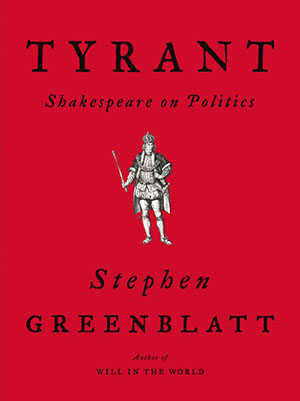— from Jens Kruse —
 The 4th chapter of the book under review opens with these words:
The 4th chapter of the book under review opens with these words:
“He is pathologically narcissistic and supremely arrogant. He has a grotesque sense of entitlement, never doubting that he can do whatever he chooses. He loves to bark orders and to watch underlings scurry to carry them out. He expects absolute loyalty, but he is incapable of gratitude. The feelings of others mean nothing to him. He has no natural grace, no sense of shared humanity, no decency.” (53)
Many readers — in the summer of 2018 in these United States — when reading this passage from Tyrant: Shakespeare on Politics (New York and London: Norton, 2018) will naturally immediately think of … yes, Richard III.
Stephen Greenblatt, literary historian, Shakespearean, author of – among many other books – Will in the World (2005) and the Pulitzer Prize winning The Swerve (2011) has written – with his Tyrant: Shakespeare on Politics (New York and London: Norton, 2018) – two books at once: an important book about, as the title states, Shakespeare on Politics, but also, without ever mentioning his name, about Trump.
He accomplishes that feat by learning from Shakespeare. In his first chapter, “Oblique Angles,” he explains how Shakespeare, in his plays on politics, avoided repression and censorship by representing contemporary political crises and concerns in the guise of historical moments and political stories from much earlier times, by costuming them in the garb of Greece, or Rome, or earlier English or Scottish history. But Greenblatt sees Shakespeare’s move not just as defensive, but also as a distancing technique that allows him to gain greater perspective and insight.
It is Greenblatt’s brilliant conceit to use this technique to provide analysis of and commentary on our times by writing about Shakespeare’s plays. In not quite 190 pages, Greenblatt expertly and concisely guides us through Henry V, Richard II, King Henry VI, Macbeth, King Lear, Julius Caesar, A Winter’s Tale, and Coriolanus. But it is Richard III that Greenblatt pays most attention to. “A Matter of Character” (chapter 4), “Enablers” (chapter 5), and “Tyranny Triumphant” (chapter 6) form the center of this book. It is in these pages that Greenblatt — while focusing entirely on the rise, reign, and fall of Richard III – answers most fully the question with which he had opened his book:
“Under what circumstances, Shakespeare asked himself, do such cherished institutions, seemingly deep-rooted and impregnable, suddenly prove fragile? Why do large number of people knowingly accept being lied to? How does a figure like Richard III or Macbeth ascend to the throne?” (1)

Stephen Greenblat, author
Greenblatt continues:
“Such a disaster, Shakespeare suggested, could not happen without widespread complicity. His plays probe the psychological mechanisms that lead a nation to abandon its ideals and even its self-interest. Why would anyone, he asked himself, be drawn to a leader manifestly unsuited to govern, someone dangerously impulsive or viciously conniving or indifferent to the truth?” (1-2)
Greenblatt zeros in on Shakespeare’s insight that “[s]uch a disaster (…) could not happen without widespread complicity.” In the opening passage of Greenblatt’s central chapter 5, “Enablers,” he writes:
“Richard’s villainy is readily apparent to almost everyone. There is no deep secret about his cynicism, cruelty, and treacherousness, no glimpse of anything redeemable in him, and no reason to believe that he could ever govern the country effectively. The question the play explores, then, is how such a person actually attained the English throne. The achievement, Shakespeare suggests, depends on a fatal conjunction of diverse but equally self-destructive responses from those around him. Together these responses amount to a whole country’s collective failure.” (66)
In the subsequent pages, Greenblatt comprehensively catalogues the various responses of these enablers. There are: (1) “[a] few characters (…) genuinely fooled by Richard;” there are (2) “also those who feel frightened or impotent in the face of bullying and the menace of violence;” then there are (3) “(…) those who cannot keep in focus that Richard is as bad as he seems to be (…) [t]hey are drawn irresistibly to normalize what is not normal;” (4) others know that Richard is a “miserable piece of work,” but “persuade themselves that there will always be enough adults in the room;” (5) “[a] more sinister group consists of those who persuade themselves that they can take advantage of Richard’s rise to power;” (6) and “[f]inally, there are a motley crowd of those who carry out his orders, some reluctantly but simply eager to avoid trouble; others with gusto, hoping to seize something for themselves.”
I will not describe each of the following chapters in detail, if only because I do not want to deprive the reader of the pleasure of following Greenblatt’s analysis and insight. Suffice it to say that his chapters on Macbeth (“The Instigator”) and King Lear (“Madness in Great Ones”) provide illuminating analyses of these great tragedies and commentary, often chilling, on our current moment.
Greenblatt ends his book on a hopeful note. He writes:
“But Shakespeare believed that the tyrants and their minions would ultimately fail, brought down by their own viciousness and by a popular spirit of humanity that could be suppressed but never fully extinguished. The best chance for the recovery of collective decency lay, he thought, in the political action of ordinary citizens.” (189)
Tyrant: Shakespeare on Politics can be checked out from the Orcas Library. It is available through Darvill’s Bookstore. It is well worth your time and/or money, not in the least because it gives you two books at once, the one promised in the title and the one delivered by the technique of “oblique angles,” one that might be called: What I Learnt About Trump by Reading Shakespeare.
**If you are reading theOrcasonian for free, thank your fellow islanders. If you would like to support theOrcasonian CLICK HERE to set your modestly-priced, voluntary subscription. Otherwise, no worries; we’re happy to share with you.**








